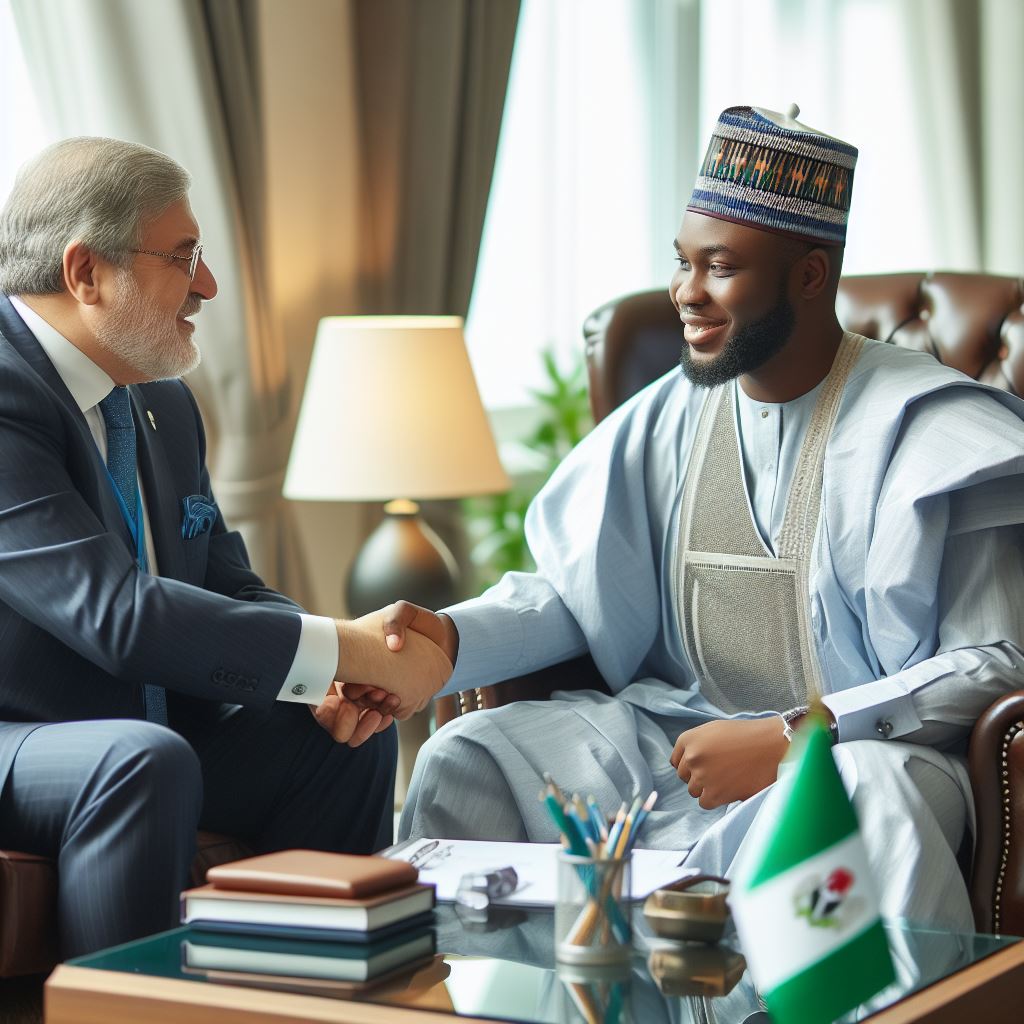Introduction
This blog post will discuss International Relations and Inter ethnic Relations.
International relations refer to the interactions and relationships between different nations and states.
Inter-ethnic relations refer to the interactions between different ethnic groups within a country.
Bridging the gap between international and inter-ethnic relations is crucial for maintaining peace and stability.
It promotes understanding, cooperation, and reduces conflicts among nations and ethnic groups.
Bridging the gap enhances diplomatic engagements, trade agreements, and cultural exchanges between countries.
It fosters economic growth, as nations can collaborate on investment opportunities and address common challenges.
Additionally, bridging the gap reduces the risk of ethnic tensions and promotes social cohesion within a country.
It encourages tolerance and respect for diversity, leading to a more inclusive and harmonious society.
Nigeria, being a multi-ethnic and diverse nation, faces challenges in both international and inter-ethnic relations.
By bridging the gap, Nigeria can enhance its diplomatic standing among nations and promote peace and stability.
It will also help address ethnic conflicts, promote social justice, and ensure equal opportunities for all.
In essence, bridging the gap between international and inter-ethnic relations is vital for Nigeria’s progress and prosperity.
It enables the country to play an active role in global affairs while fostering unity and development at home.
Historical Context
Nigeria’s colonial past and its impact on relations
Nigeria’s past is shaped by colonial forces carving territories, disregarding cultural boundaries.
Colonization disrupted indigenous systems, fueling future tensions.
Nigeria’s history reflects a mosaic of influences: colonization, independence struggles, ethnic rivalries, and global interactions.
Colonial powers’ arbitrary divisions disregarded local cultures, setting the stage for post-independence challenges.
Formation of independent Nigeria and its challenges
Nigeria gained freedom in 1960, yet inherited complex challenges.
The amalgamation of diverse ethnic groups posed governance hurdles.
Conflicts and tensions between different ethnic groups
Various ethnicities coexisted, yet historical disparities sparked tensions.
Struggles for power and resources intensified inter-ethnic rivalries.
The amalgamation of diverse ethnic groups under a single entity, Nigeria, generated governance complexities.
Inter-ethnic tensions surfaced due to disparities in resources and power distribution. This led to conflicts, hindering national unity.
Moreover, Nigeria’s interactions on the global stage influenced its internal dynamics significantly.
Interaction with other countries and its effects on international relations
Nigeria’s international engagements impacted internal dynamics. Trade, alliances, and cultural exchanges shaped the country’s identity.
International trade and alliances affected the country’s economic and political landscape.
Cultural exchanges enriched Nigeria’s diversity but also fueled identity conflicts.
Bridging the gap between international relations and inter-ethnic relations in Nigeria demands acknowledging this intricate historical context.
Understanding colonial legacies, the challenges of independence, and the complexities of inter-ethnic dynamics are crucial.
Additionally, recognizing the impacts of global interactions on Nigeria’s internal affairs is pivotal.
Efforts to foster unity and cooperation among ethnic groups must consider these historical layers.
Moving forward, acknowledging past grievances, promoting inclusivity, and fostering dialogue are imperative.
Embracing diversity while forging a collective Nigerian identity is vital for peaceful coexistence.
Nigeria’s journey to reconcile its historical legacy with the present can pave the way for stronger international relations and harmonious inter-ethnic relations.
As Nigeria navigates its path, lessons from history offer insights into fostering unity amidst diversity.
Bridging gaps requires a multifaceted approach, acknowledging the intertwined nature of historical, ethnic, and international factors.
Read: Emerging Trends in Nigeria’s Leisure & Tourism Sector
Current State of International Relations in Nigeria
Nigeria’s Role in Regional and Global Affairs
Nigeria plays a significant role in regional and global affairs.
It is the most populous country in Africa and holds a strategic position in the continent.
Transform Your Career with Expert Guidance
Get personalized mentorship consulting that’s tailored to your unique path. Our expert advice is actionable and exclusive.
Get StartedThis position gives Nigeria the opportunity to exert influence and shape policies in the region.
As a member of the African Union (AU) and the Economic Community of West African States (ECOWAS), Nigeria actively participates in regional decision-making processes.
Nigeria has a long-standing commitment to promoting peace, stability, and security within its neighboring countries.
It has intervened in conflicts, such as the Liberian and Sierra Leonean civil wars, to restore peace.
Additionally, Nigeria is a major contributor to peacekeeping missions, showcasing its commitment to global security.
Diplomatic Relations with Other Countries
Nigeria maintains diplomatic relations with numerous countries around the world.
It has a network of embassies and consulates, facilitating diplomatic communication and cooperation.
Through these diplomatic channels, Nigeria engages in dialogue, negotiation, and collaboration with other nations.
The country aims to build strong bilateral and multilateral relationships to enhance its international standing.
While Nigeria focuses primarily on its relations with other African nations, it also cultivates ties with countries beyond the continent.
Nigeria’s diplomatic efforts aim to promote economic cooperation, cultural exchanges, and mutual understanding.
Economic Partnerships and Foreign Investments
Nigeria actively seeks economic partnerships and foreign investments to boost its economy.
It recognizes the significance of international cooperation in achieving sustainable development.
The country has attracted investments from various nations, particularly in sectors like oil and gas, agriculture, and telecommunications.
Foreign direct investment (FDI) has contributed to the modernization of infrastructure and the diversification of Nigeria’s economy.
Through economic partnerships, Nigeria benefits from technology transfer, job creation, and increased trade opportunities.
Furthermore, these collaborations facilitate knowledge exchange and capacity building, promoting socio-economic growth.
International Treaties and Agreements Nigeria is Part of
Nigeria is an active participant in various international treaties and agreements.
It is a signatory to several conventions, such as the United Nations Charter and the Universal Declaration of Human Rights.
Participation in these agreements demonstrates Nigeria’s commitment to upholding global standards and respecting human rights.
Moreover, Nigeria is a member of organizations like the World Trade Organization (WTO) and the International Monetary Fund (IMF).
Membership in these institutions provides Nigeria with opportunities to voice its interests and influence global economic policies.
By actively participating in international treaties and agreements, Nigeria works towards fostering a peaceful and inclusive global community.
In fact, Nigeria’s current state of international relations showcases its active engagement in regional and global affairs.
The country’s role in shaping regional decisions, maintaining diplomatic ties, attracting foreign investments, and participating in international agreements underscores its commitment to socio-economic development and global peace.
Read: Key Theoretical Approaches in Nigerian International Relations Curriculum
Current State of Inter-ethnic Relations in Nigeria
Major ethnic groups and their interactions
Nigeria is made up of over 250 ethnic groups, each with its own language and culture.
The three major ethnic groups are the Hausa-Fulani, Yoruba, and Igbo.
There is a history of tensions and conflicts between these major ethnic groups.
Causes of inter-ethnic conflicts and tensions
Historical factors such as competition for resources, power, and political dominance contribute to inter-ethnic conflicts.
Religious differences and stereotypes also play a role in the tensions between ethnic groups.
Lack of effective governance and unequal distribution of resources further exacerbate the conflicts.
Efforts made for peace and reconciliation
The Nigerian government has established various programs and institutions to promote peace and reconciliation.
The National Orientation Agency conducts campaigns and advocacy programs to promote unity and understanding.
Inter-ethnic dialogue platforms and peace committees have been created to address conflicts.
Impact of inter-ethnic relations on national unity and development
Inter-ethnic conflicts have had a negative impact on Nigeria’s national unity and development.
Ethnic tensions often lead to violence, which hinders economic growth and stability.
Investment is discouraged, and social cohesion is weakened as a result of inter-ethnic conflicts.
In short, the current state of inter-ethnic relations in Nigeria is characterized by tensions and conflicts between different ethnic groups.
The major ethnic groups, such as the Hausa-Fulani, Yoruba, and Igbo, have a long history of interactions, but these interactions are often marred by competition, religious differences, and unequal distribution of resources.
Efforts have been made by the government and various institutions to promote peace and reconciliation, but the impact of inter-ethnic conflicts on national unity and development remains significant.
It is crucial for Nigeria to continue addressing these issues and work towards building a more inclusive and harmonious society.
Read: Nigeria’s Role in Global Politics: An International Relations Lens

Challenges in Bridging the Gap
Building strong relationships and bridging the gap between nations and ethnic groups is not an easy task.
Nigeria, a diverse country with over 250 ethnic groups, faces various challenges in achieving harmonious international and inter-ethnic relations.
These challenges play a significant role in hindering the progress towards unity, peace, and development.
Lack of understanding and cultural differences
One of the primary challenges in bridging the gap is the lack of understanding and cultural differences among different ethnic groups.
Nigeria’s vast ethnic diversity often leads to misunderstandings, misconceptions, and stereotypes.
Language barriers, customs, traditions, and values vary greatly, making it difficult for effective communication and mutual respect.
People tend to lean towards what they are familiar with, leading to ignorance and a lack of appreciation for other cultures.
This lack of understanding often results in tension and conflicts, preventing the formation of strong inter-ethnic relationships.
Historical grievances and deep-rooted conflicts
Historical grievances and deep-rooted conflicts pose another significant obstacle in bridging the gap.
Nigeria has a history of ethnic conflicts and tensions, some of which date back to pre-colonial times.
These historical grievances have created deep scars and animosity among ethnic groups, making it challenging to build trust and cooperation.
The wounds of past conflicts, such as the Biafra War, are still fresh in the memories of many Nigerians.
These unresolved conflicts perpetuate divisions and hinder efforts towards reconciliation and unity.
Without addressing these historical grievances, it is difficult to achieve lasting peace and genuine inter-ethnic relations.
Political and economic interests that perpetuate divisions
Political and economic interests often perpetuate divisions among ethnic groups.
Nigeria, like many other nations, faces challenges in balancing the interests and aspirations of diverse ethnic groups.
Political parties and individuals may exploit ethnic identities and differences to gain power and advance their agendas.
Moreover, economic disparities and inequalities exacerbate ethnic tensions.
Limited resources and opportunities create competition among ethnic groups, leading to resentment and conflicts.
The pursuit of economic and political gains at the expense of inter-ethnic harmony hampers the progress towards bridging the gap.
Limited efforts for dialogue and collaboration
Lastly, limited efforts for dialogue and collaboration hinder the bridging of the gap between international relations and inter-ethnic relations in Nigeria.
Meaningful dialogue and collaboration are essential for understanding, respect, and trust-building among different groups.
However, in Nigeria, there are inadequate platforms, initiatives, and policies that promote dialogue and collaboration between ethnic groups and the international community.
Limited resources, lack of political will, and competing priorities often overshadow the need for genuine efforts towards bridging the gap.
In general, Nigeria faces significant challenges in bridging the gap between international relations and inter-ethnic relations.
The lack of understanding, historical grievances, political and economic interests, and limited efforts for dialogue all contribute to the difficulties in achieving unity, peace, and development.
Addressing these challenges requires a multi-faceted approach that promotes cultural understanding, addresses historical grievances, balances political and economic interests, and prioritizes dialogue and collaboration.
Only through a concerted effort can Nigeria overcome these challenges and move towards a more harmonious and prosperous future.
Read: Skill Sets Every Diplomacy Student in Nigeria Should Develop
Strategies for Bridging the Gap
Promoting cultural exchange and understanding
Organize cultural festivals that showcase the traditions and values of different ethnic groups.
Encourage schools to include multicultural education programs to promote tolerance and acceptance.
Sponsor exchange programs that allow individuals from different ethnic backgrounds to live and learn together.
Promote inter-ethnic marriages and relationships to foster a sense of unity and integration.
Encouraging dialogue and communication between different ethnic groups
Facilitate regular town hall meetings where individuals from diverse ethnic backgrounds can express their concerns.
Organize panel discussions and forums to promote understanding and address misconceptions.
Create platforms for open and honest conversations to discuss historical conflicts and find ways to reconcile.
Encourage media outlets to provide fair and balanced coverage of inter-ethnic relations and issues.
Strengthening government policies for inclusivity and equal representation
Implement affirmative action policies to ensure representation of all ethnic groups in government positions.
Create laws that protect the rights of minority ethnic groups and ensure their equal access to resources.
Establish independent bodies to monitor and enforce policies that promote inclusivity and equality.
Provide financial support and resources to ethnic communities to promote their socioeconomic development.
Emphasizing the importance of national unity and shared goals
Develop national symbols and anthems that represent the diverse cultures and ethnic groups in Nigeria.
Encourage the celebration of national holidays and events that promote unity and solidarity.
Promote campaigns and initiatives that highlight the achievements and contributions of all ethnic groups.
Invest in infrastructure projects that benefit all regions and foster a sense of shared progress.
By implementing these strategies, Nigeria can effectively bridge the gap in international and inter-ethnic relations.
It is essential to promote cultural exchange, encourage dialogue, strengthen government policies for inclusivity, and emphasize national unity and shared goals.
Only through these efforts can Nigeria truly harness its diverse population and achieve peace, progress, and prosperity.
Case Studies and Success Stories
Examples of successful international relations initiatives
The establishment of diplomatic ties with neighboring countries contributed to peace and stability.
Collaborative efforts to combat transnational crimes led to increased security and cooperation.
Joint economic ventures with foreign partners boosted trade and investment opportunities.
Cultural exchange programs fostered mutual understanding and appreciation between nations.
Participation in peacekeeping missions showcased Nigeria’s commitment to global peace and security.
Instances where inter-ethnic relations improved
Community dialogue and reconciliation initiatives helped resolve long-standing conflicts between ethnic groups.
Interventions by religious leaders and organizations promoted tolerance and peaceful coexistence.
Government policies that emphasized inclusivity and equal representation reduced ethnic tensions.
Cooperation between local communities in shared development projects encouraged inter-ethnic collaboration.
Educational programs that highlighted the importance of diversity and unity positively influenced inter-ethnic relations.
Lessons learned from these experiences
Effective communication and dialogue are vital for resolving conflicts and bridging inter-ethnic gaps.
Building trust and fostering mutual respect are essential in promoting harmonious relationships.
Embracing diversity and inclusivity enhances social cohesion and strengthens national unity.
Economic partnerships and cultural exchanges create opportunities for greater understanding and cooperation.
Government policies and initiatives should prioritize addressing ethnic inequalities and promoting equitable representation.
In a nutshell, Nigeria has witnessed success stories in both international and inter-ethnic relations through various initiatives and experiences.
These examples prove that positive change is achievable with the right strategies and commitment from all stakeholders.
By learning from these case studies and implementing the lessons they provide, Nigeria can continue to bridge the gap in international and inter-ethnic relations, fostering peace, cooperation, and harmony within its borders and beyond.
Conclusion
Bridging the gap in international and inter-ethnic relations in Nigeria is crucial for the country’s progress.
The harmonious coexistence of different ethnic groups and positive international relations can lead to stability, economic growth, and social development.
By bridging the gap, Nigeria can tap into the potential of its diverse population and cultures, fostering unity and mutual respect.
This will enhance collaboration and cooperation, leading to shared prosperity and the ability to effectively tackle challenges such as poverty, corruption, and insecurity.
It is not only the responsibility of the government but also every individual to actively contribute to bridging the gap.
Each person should promote understanding, tolerance, and respect for different cultures and beliefs.
This can be done through education, dialogue, and cultural exchange programs.
The government should also play a crucial role by implementing inclusive policies that promote equal opportunities, address grievances, and protect the rights of all individuals and ethnic groups.
They should prioritize diplomacy, effective communication, and cooperation with other nations to strengthen international relations.
In doing so, Nigeria can have a united and prosperous future. With a strong emphasis on bridging the gap, the country can harness its potential and move towards sustainable development, peace, and stability.
By fostering positive international and inter-ethnic relations, Nigeria can position itself as a global player and a beacon of hope for other nations facing similar challenges.




